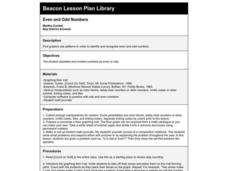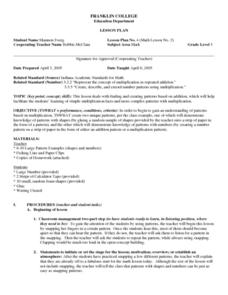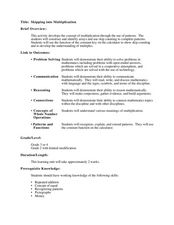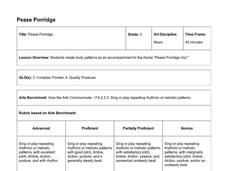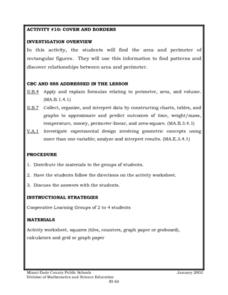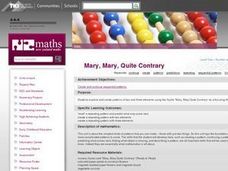Curated OER
Marble Mania
Students explore the concept of probability. In this probability lesson, students develop an understanding of probability by pulling marbles out of a bag and recording the data. Students use the recording sheet to discuss the results of...
Curated OER
Translating Patterns
In this worksheet, students examine picture patterns which have blank boxes beneath each picture. Students translate the pattern by coloring the boxes. Example: rose, rose, bird, rose, rose. (red, red, blue, red, red).
Curated OER
Terrific Tessellations
Students create, transform, and critique their own piece of artwork. In doing this lesson, students get more experience working with angles, lines, and measurement. They gain experience seeing, and creating their own patterns and shapes.
Curated OER
Even and Odd Numbers
First graders use patterns in order to identify and recognize even and odd numbers.
Curated OER
Problem Solving Strategy: Make a Model
In this problem solving strategy worksheet, students complete a graphic organizer to help solve a problem. Students complete 4 sections: understand, plan, solve and look back. Houghton Mifflin text referenced.
Curated OER
Finding and Creating Addition Patterns
Third graders listen as teacher snaps her fingers in a certain pattern and then join in as they become familiar with the pattern and then repeating it. They observe a patterns of shapes and repeat after the teacher has explained it....
Curated OER
Two Part Patterns
Students stand in a boy-girl-boy-girl pattern to demonstrate what a pattern might be. They separate into groups and create two part patterns using construction paper of different colors.
Curated OER
Rescue the Pattern
Students describe a wide variety of patterns. They extend a wide variety of patterns. Students write rules for a wide variety of patterns. Students represent, analyze, and generalize a variety of patterns with tables, graphs, and words.
Curated OER
Number Patterns and Sequences
In this number patterns and sequences worksheets, students complete activities for number patterns and sequences including Fibonacci's Sequence, lines, regular polygons, and towers. Students complete 15 problems.
Curated OER
Skipping Into Multiplication
Young mathematicians study the relationship between skip counting and multiplication. They build on skip counting skills and examine arrays while studying multiplication. Resources are provided.
EngageNY
Trigonometric Identity Proofs
Proving a trig identity might just be easier than proving your own identity at the airport. Learners first investigate a table of values to determine and prove the addition formulas for sine and cosine. They then use this result to...
Hawaiʻi State Department of Education
Pease Porridge
Practice using different ways to express a single pattern. The class uses concrete, pictorial, and numerical modes to represent patterns found in a simple rhyme. They will move their bodies, use body percussion, draw, and use numbers to...
Curated OER
Counting to 100: Step-by-Step
Introduce your pupils to the hundreds chart! This pair of worksheets is designed to walk them through the patterns they see in the chart as they count by ones and 10s. They fill in missing numbers on a hundreds chart, using guided steps....
Curated OER
Investigation - What's the Number?: Division
Seventh graders explore number sentences using a variety of strategies making each equation a true sentence. Students examine strategies such as patterns, trial and error, working backwards, and related problems. In groups, 7th graders...
Curated OER
Cover and Boarders
Students find the area and perimeter of rectangular figures. They use this information to find patterns and discover relationships between area and perimeter. Students apply and explain formulas relating to perimeter, area, and volume.
Curated OER
Relate Counting to Addition and Subtraction
Use patterns to practice basic addition; pupils count by two, starting from eight and counting on to 20. They record the five numbers missing from the sequence. Below, the instructional activity walks learners through the process they...
Curated OER
Arranging Numbers from 1 to 5
Kindergarteners arrange manipulatives or everyday objects in groups of one through five. They identify groups seen in pictures of nature and compare same numbers of different objects.
Curated OER
Investigation Can You Build This?
Students work in small groups to explore spatial relationships while building with color cubes. Students must identify positions of blocks to partner, recreate a model, and color a sketch of their structure appropriately.
Curated OER
What is the Average Height of Your Class?
In this statistics lesson plan, learners use an on-line form generator create a class-specific form, then complete the form, view a graph and data analysis, and draw conclusions.
Curated OER
The Irrational Numbers
In this algebra activity, students solve rational numbers using addition, subtraction and multiplication. They identify the rules of solving rational and irrational numbers. There are 50 questions on 6 pages.
Curated OER
Mary, Mary, Quite Contrary
First graders use simple vegetable cut out and colored paper flower peddles to make simple patterns. They start out with a simple 2-element patterns around the theme of a daisy and increase in difficulty.
Curated OER
Hooray for Arrays!
For this math game activity worksheet, students use their problems solving skills as they play a math game in order to review arrays.
Curated OER
Rhythm and Counting
Students repeat patterns while listening to music. In this patterning activity, students listen to a pattern on a tape of music and reproduce it by clapping or stamping their feet. They listen to stories about famous composers.
Curated OER
Tessellations
Young scholars create tessellations. In this geometry lesson, students use polygons to create different patterns by rotation. They identify the reasons for polygons to create the type of tessellation it does.





